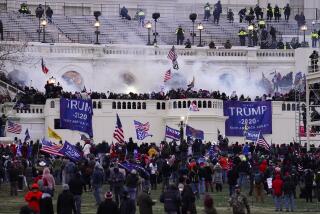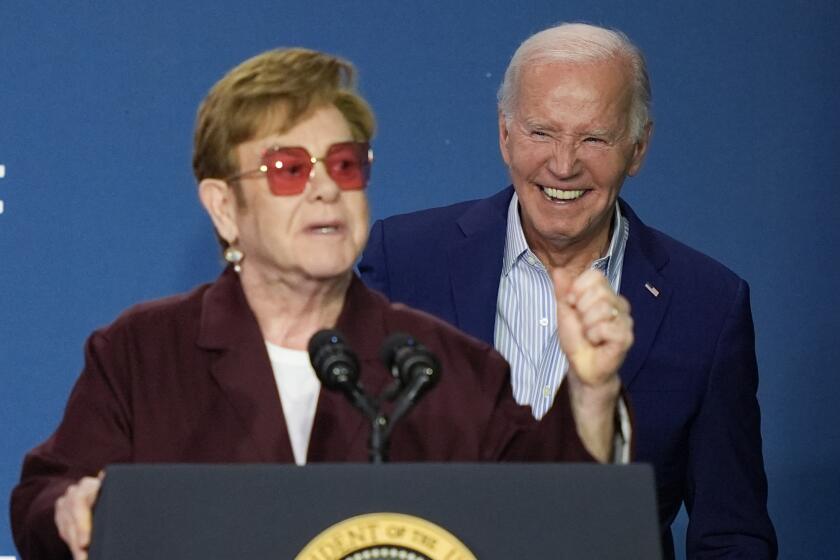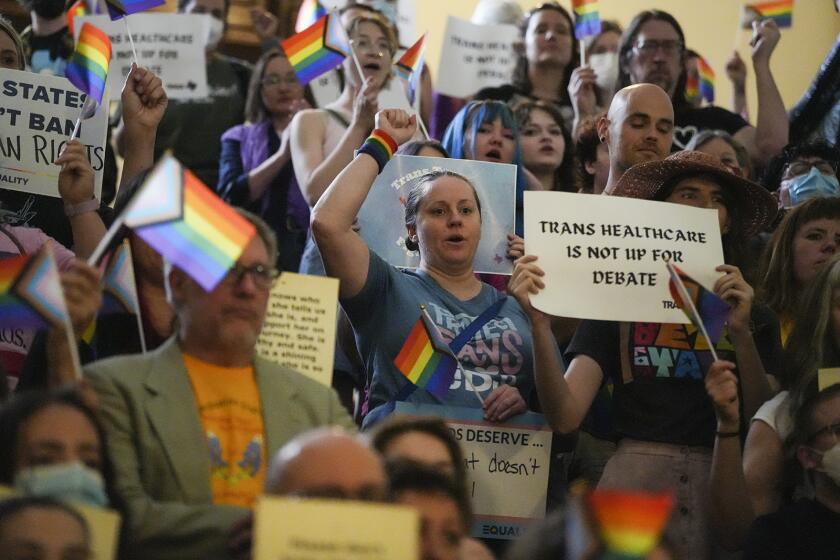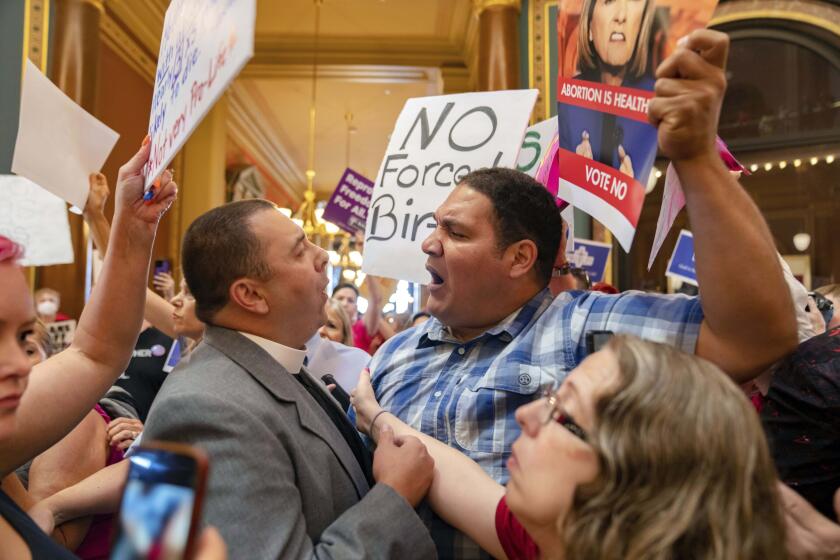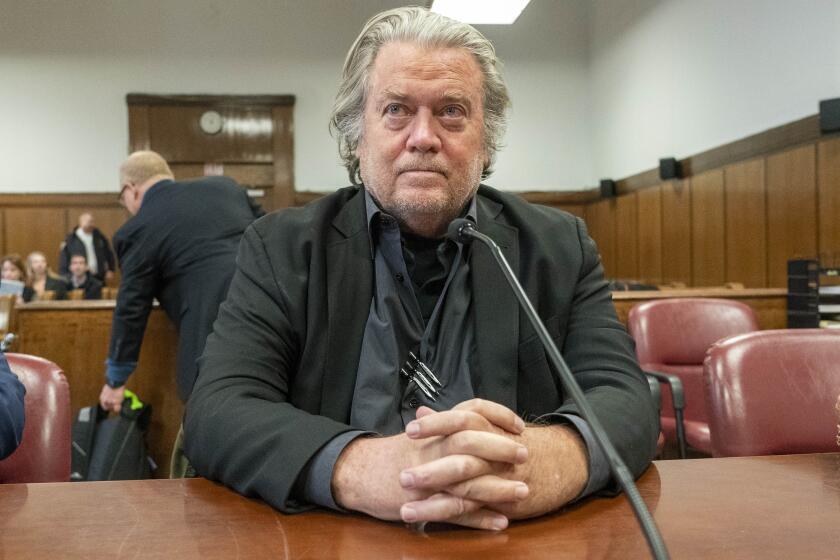Kadafi’s Son Calls for Closer Ties With U.S.
The elder son of Libyan leader Moammar Kadafi, viewed by many as his father’s possible successor, says he hopes his country’s political and economic opening to the U.S. will soon lead to the normalization of relations.
Seif Islam Kadafi, 33, has served as an unofficial emissary to the West, consulting with foreign officials, issuing calls for political and economic reforms at home and defending Libya’s human rights record. In Canada in September to open an exhibit of Libyan art that included his own paintings, he held unofficial meetings with political leaders, including Prime Minister Paul Martin.
“I’m not saying we are a democratic state 100%,” he said in an interview. “But we have made Libya a model for the Middle East.”
Critics remain doubtful. They say Libya’s overtures to the West are an attempt to end its political isolation and attract foreign investment to stabilize the economy. Political opposition is prohibited, and international human rights groups have reported that Libyan security forces arbitrarily arrest regime critics and detain them without charge.
“If Seif was a true reformer, he wouldn’t defend the existing anti-democratic political structures,” said Mohammed Ali Abdalla, U.S. spokesman for an exile group known as the National Front for the Salvation of Libya. “His goal is to gain power and continue his father’s legacy.”
With his shaved head and fashionable dark business suit, Kadafi resembles a Wall Street yuppie. He speaks heavily accented but fluent English. After graduating from university in Libya, he received an MBA in Vienna and a doctorate in global governance in London.
In Tripoli, the Libyan capital, he heads a charity that funds overseas development projects and has negotiated the release of hostages seized by Islamic radicals in countries such as the Philippines.
The Libyan leader, who is a colonel, has six other children. Several also have been mentioned as possible successors, including Saadi Kadafi, who runs the Libyan Soccer Federation and briefly played on an Italian team. The colonel’s only daughter, Ayesha, is a lawyer who volunteered to join Saddam Hussein’s defense team. Seif Kadafi downplays, but doesn’t deny, political aspirations.
“I’m not a pure political person, nor a pure philanthropist, nor a pure painter,” he said. “I am a multilayered citizen.”
Col. Kadafi, who is believed to be in his early 60s, has held power since 1969. Barring unforeseen health problems, he isn’t expected to step down anytime soon. A Libyan American academic who is close to Seif said the younger Kadafi’s political influence extended beyond his status as a potential successor to his father.
“A lot of people don’t want to talk about issues like human rights, but he keeps raising [difficult issues] and testing the waters,” said the academic, who spoke on condition of anonymity because of the sensitivity of the topic for both Libyan exiles and government officials.
During most of Kadafi’s rule, American relations with Libya have been tense. However, they have warmed considerably in recent years.
The thaw began with Libya’s decision in 2003 to accept responsibility for the bombing 15 years earlier of Pan Am Flight 103 over Lockerbie, Scotland, which killed 270 people. It agreed to pay $2.7 billion to the families of the victims. Seif was a prominent supporter of the deal and backed Libya’s decision in 2003 to end its program to develop weapons of mass destruction.
Secretary of State Condoleezza Rice met with Libyan Foreign Minister Mohammed Abderrahmane Chalgam during the United Nations General Assembly in New York in September. The State Department said Rice pledged to “broaden and deepen” ties between the countries.
In the interview, Seif Kadafi strongly backed the rapprochement. He said that he hoped Rice would soon visit Libya and that President Bush would be welcome as well.
The younger Kadafi also endorsed Libya’s participation in the U.S.-declared war on terrorism, which has included giving the CIA files on Libyans with alleged ties to international terrorism and handing Islamic radicals over to neighboring pro-Western governments.
One sign of that collaboration is found in flight records for two private planes leased by the CIA, which Human Rights Watch allowed the Los Angeles Times to review.
The logs show 15 flights through Tripoli’s Mitiga airport, formerly part of Wheelus Air Base, which was run by the U.S. until Kadafi seized power. One of the planes, a Gulfstream executive jet, made several round trips between Washington and Tripoli. The second plane, a Boeing 737, traveled in September 2004 from Tripoli to Guantanamo Bay, Cuba, where the Pentagon runs a detention facility for extremist suspects.
Seif Kadafi said that the CIA had opened a station in Libya and that there were regular exchanges and meetings between the countries’ intelligence agencies.
“Intelligence cooperation is in our mutual benefit,” he said. “We have our own domestic terrorist groups. We have managed with the Americans to abort terrorist attacks in Libya, including attacks on Western interests.”
The Kadafi scion said Libya should be removed from the State Department’s list of state sponsors of terrorism. If that happens, he said, Libya would be willing to join a Pentagon program aimed at countering the Al Qaeda terrorist network in the region.
The Pentagon has said it would like Libya to be admitted to the program, which now includes Algeria, Nigeria, Morocco and six other countries.
The State Department has said Libya needs to take additional steps to shed the pariah status. In September, Rep. Tom Lantos (D-Burlingame), who was the first of at least 19 members of Congress to travel to Libya since January 2004, called for Libya to be removed from the list.
Seif Kadafi strongly criticized the invasion of Iraq but said that a U.S. withdrawal now would lead to chaos. “The invasion was a mistake, it remains a mistake, and in 10 years it will be a mistake,” he said. “But an immediate withdrawal now is also a mistake and a trap.”
He proposed that the Bush administration open a dialogue with Iraqi insurgents so that a negotiated withdrawal down the road can be “smooth, with a minimum backfire and allow the U.S. to save face.”
On the economic front, Seif Kadafi has enlisted Western economists such as Michael Porter of Harvard University to draft proposals designed to open up Libya’s state-dominated economy. U.S. firms, especially oil companies, have been clamoring to invest in Libya, and Seif Kadafi said he welcomed their interest.
“We all believe in reforms, a better standard of living,” he said. “No rational person would reject that.”
He has attracted attention by making relatively conciliatory statements about Israel, which he once described admiringly as a democracy. Libya’s deputy foreign minister said this year that the younger Kadafi’s views did not reflect official policy.
Kadafi said he did not foresee Libya establishing diplomatic ties with Israel and, like his father, favored a single state for both Jews and Palestinians. But he also said a ban on dialogue between Arab governments and Israel made little sense when Palestinians were negotiating with the Jewish state.
“We don’t oppose other Arab countries making peace [with Israel], and we don’t encourage it,” he said. “It’s their business.”
More to Read
Start your day right
Sign up for Essential California for news, features and recommendations from the L.A. Times and beyond in your inbox six days a week.
You may occasionally receive promotional content from the Los Angeles Times.


